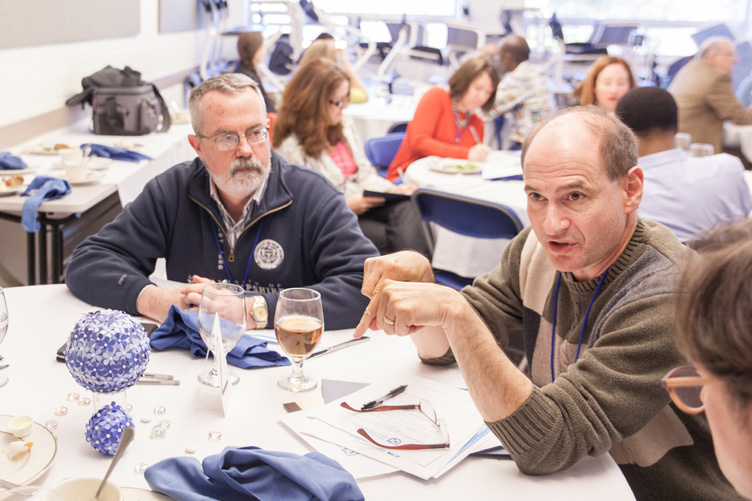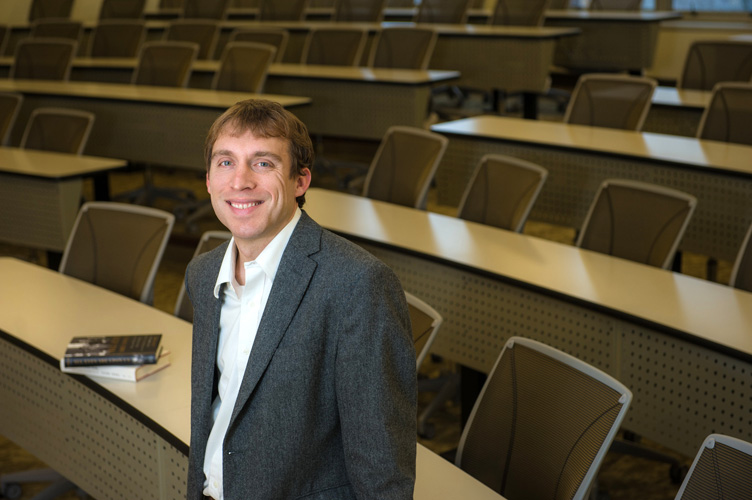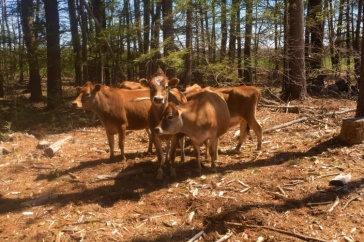
(left to right) Professors James Farrell and David Kaye at a grand challenges interdisciplinary networking event held in April. (Photo: Ron St. Jean Photography)

Jason Sokol (Photo: Valerie Lester)
Race in America
Historian Jason Sokol is the author of “All Eyes are Upon Us: Race and Politics from Boston to Brooklyn” (Basic Books, 2014) and “There Goes My Everything: White Southerners in the Age of Civil Rights, 1945-1975” (Vintage, 2007). His third book, “Shot Rings Out: How King’s Death Was Lived,” is forthcoming.

“One of the great problems of our time is the persistence of racial injustice in the United States” says Jason Sokol, associate professor of history. “And one of our grand challenges is to build a truly multiracial society, one in which racial minorities can enjoy equality, opportunity, freedom and safety — not just in theory but in fact.”
Sokol engages with this challenge every day — in the courses he teaches on 20th century American racial history, in the books he’s authored in which he explores the roots of white racism, in opinion pieces he’s published. He’s careful to highlight those moments, however rare, when white Americans have pushed back against racism. It’s those impulses that can help point the way forward, he says.
Sokol’s work is just one example of many efforts across the College of Liberal Arts to address the pressing problems of our time. This is work the college is hoping will be more visible and more relevant than ever through a new project called the Grand Challenges for the Liberal Arts Initiative (GCLAI).
With support from the Provost’s Office, liberal arts faculty and administrators are developing undergraduate opportunities, faculty research collaborations and public engagement projects that will strengthen the college's commitment to addressing grand challenges, defined as urgent, widely-shared problems that call for large-scale, long-term, coordinated responses.
Challenges such as climate change, addiction, civic discourse and interpersonal violence are complex and know no disciplinary boundaries, so a collaborative approach is key. Underlying the initiative is the belief that the greatest challenges are more than just technical problems that can be addressed by science and technology, business and industry — they need the liberal arts. Even the most seemingly scientific of subjects, such as climate change, requires humanistic inquiry to fully understand. Just consider how perceptions and beliefs have driven climate change policy. (See The Human Factor below for two examples of liberal arts faculty working on human–nature interaction.)

Kenneth Johnson. (Photo: Ron St. Jean Photography)
The Human Factor
Sociologist and demographer Kenneth Johnson collaborates with Mark Ducey, a forest biometrics expert in the UNH College of Life Sciences and Agriculture, to examine how human–nature interaction impacts the structure of the forests, the bio-mass they contain and the amount of carbon that is stored in forests, called carbon sequestration. Since forests contain the bulk of the stored carbon on Earth, and increased carbon in the atmosphere is widely believed to be the main cause of global warming, factors that impact carbon storage have implications for climate change.
“By combining fine scale demographic data from the census on the distribution of populations and housing, with detailed remote sensing data on land cover, we are able to produce better models of forest biomass and carbon sequestration than is possible with either the remote sensing or population data alone,” says Johnson.

Meghan Howey with students working at the Great Bay Estuary. (Photo: Val Lester)
Meghan Howey, associate professor of anthropology, examines the social, economic and ideological processes that led to the current era of human dominance over nature, called the Anthropocene.
“How did past societies perceive, or fail to perceive, their impact on the natural world and how did this affect their quality of life? How do such historical trajectories inform us and ecosystems today?” asks Howey.
Howey’s interdisciplinary work includes research on Great Bay Estuary in New Hampshire in the first systematic survey of those waters. Funded by the college’s Center for the Humanities, the project seeks to establish the trajectory of occupation in the estuary from ca. 9500 BC to 1900 AD.
Heidi Bostic, dean of the College of Liberal Arts, suggests in The Humanities Must Engage Global Grand Challenges, an article published in the Chronicle of Higher Education, that the humanities broadly defined should in fact play a fundamental role in addressing grand challenges. These disciplines can provide historical and cultural context, help define priorities, and communicate challenges through high-impact and persuasive storytelling. Ultimately, what humanities and broad liberal arts provide is meaning.
“Scientists and engineers remind us again and again that these matters (grand challenges) must be understood within broader realms of human concern, like health, vulnerability, sustainability and the joy of living,” writes Bostic. “These are basic issues of meaning, purpose and value, questions that the humanities confront. We can thus see underlying all of the other grand challenges the fundamental questions at the heart of humanistic inquiry: Who are we and how ought we to live?”
The grand challenges initiative seeks to enable students to ask — and answer — those questions. In development now is a pilot to integrate project- and team-based grand challenges units into existing inquiry and inquiry attribute courses, small first- and second-year courses designed to inspire curiosity in students. Starting in the fall of 2017, students in select inquiry courses will work as teams to contextualize, research and propose interventions for grand challenges.
The fall will also bring the first GCLAI scholarship winners. Six awards of $2,500 each will be given to incoming liberal arts students from New Hampshire who are interested in grand challenges work.
Honors students will have the opportunity to take a new set of linked courses in the fall that investigate addiction from the varying perspectives of history, humanities, communication and sociology.
And that’s just a start. New student research and innovation grants will be awarded in cooperation with the Hamel Center for Undergraduate Research starting this summer, and new curricula in the problem-solving methodology of “design thinking” are in the planning stages.
To develop faculty research and capacity in grand challenges, GCLAI is fostering interdisciplinary research and grant writing. This spring, faculty across the university — many who had never met before — participated in a networking session to identify overlapping research. Ten Murkland Interdisciplinary Scholarship Teams will assemble over the next two years. They’ll prioritize grand challenges and write grant applications to support further research.
“The number of faculty who participated (in the networking session) and the energy in the room were phenomenal,” says Brett Gibson, associate dean of the college and an event organizer. “Liberal arts faculty members have long been engaged in grand challenge research, but for some, they have been working in isolation. It was invigorating to many to make these new connections.”
The third prong of the initiative is public engagement. Those making policy decisions, voting for elected officials or creating solutions in various sectors can benefit from research and activities taking place right here at UNH — but only if they know about them and are involved. A public forum on grand challenges is planned for the fall; the date has not yet been set. The event will include a celebration of the New Hampshire Humanities Collaborative, a related grant-funded project launched this year that supports the transfer of community college students in the humanities to the university and develops a humanities curriculum focused on grand challenges.
GCLAI is set to roll out over a three-year timeline, so there’s much more to come. The initiative’s website will have the latest and most comprehensive information.
Bostic, who is passionate about the project, said in a recent talk she gave on the subject, “Responding to grand challenges is simply something we are called to do. It’s hard to ground that claim absolutely, but I would say that helping other people and trying to make the world a better place are ends in themselves.”
-
Written By:
Susan Dumais '88 '02G | College of Liberal Arts


















































